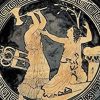Analysis The watchman’s speech sets the gloomy, tense mood that will be maintained throughout the play. There is skillful artistry evident in this powerful opening and full use is made of dramatic irony. Moreover, the watchman has been made into a real man instead of a mechanical giver of information. […]
Read more Summary and Analysis Agamemnon: Prologue (Lines 1-39)Summary and Analysis The Oresteia: Introductory Note
Each play of the trilogy is a self-contained dramatic unit, although the endings of the first two plays lead naturally into the play that follows them. Any of the three plays can be presented alone without too much loss of understanding, but the meaning and dramatic effect of the works […]
Read more Summary and Analysis The Oresteia: Introductory NoteCharacter List
Although the trilogy covers a period of several years, Aeschylus does not show any changes in Clytaemestra’s personality. This may be because any sign of weakness or remorse on her part would have lessened sympathy for Orestes in the last two plays, but it should also be remembered that Aeschylus’ […]
Read more Character ListAbout Agamemnon, The Choephori, and The Eumenides
Besides writing the plays and composing the accompanying music, the poet was responsible for directing the production and supervising rehearsals. Often, in earlier times, he acted the role of the protagonist, or central character, also, but this tradition seems to have been broken in the time of Sophocles. The poets […]
Read more About Agamemnon, The Choephori, and The EumenidesPlay Summary
When Atreus died, the throne of Argos was inherited by his son Agamemnon, who married Clytaemestra, the daughter of the king of Sparta. They had three children — Iphigenia, Electra, and Orestes. The other son of Atreus, Menelaus, married Helen, the sister of Clytaemestra, and in due course became the […]
Read more Play Summary
